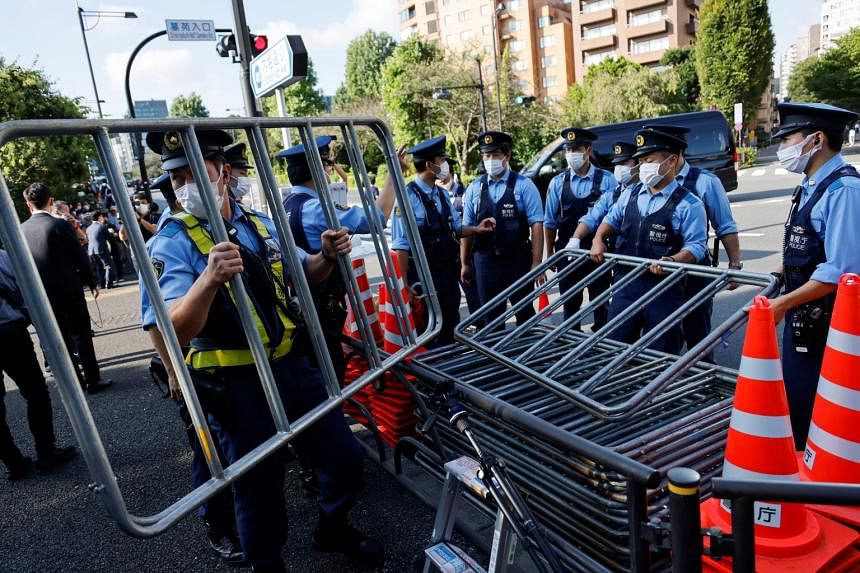TOKYO - Former Japanese prime minister Shinzo Abe, a giant in diplomacy yet polarising at home, was given a final send-off in a state funeral on Tuesday.
The four-hour memorial service, attended by 4,300 guests, including 700 foreigners, began at 2pm (1pm Singapore time) at the Nippon Budokan arena that has hosted concerts and Olympic events.
It is a stone’s throw from the Yasukuni Shrine – a symbol of Japan’s wartime past – in a fitting reminder of a leader who had tried to exorcise the ghosts of history by, as Prime Minister Fumio Kishida said in his eulogy on Tuesday, “challenging one fundamental legacy issue of the war after another”.
Yet, Mr Abe’s policies were one of the reasons for his divisiveness in life and in death, despite being Japan’s longest-serving premier at eight years and eight months.
Under cloudless skies, a snaking queue stretching as long as 4km formed as the public offered floral tributes outside the arena. An online portal gathering tributes had more than 405,000 signatures by Tuesday night.
But in front of the National Diet, 15,000 people held a peaceful protest against the state funeral, paralleled by smaller-scale demonstrations across Japan.
Inside the Nippon Budokan, the mood was sombre.
Mr Abe’s ashes, in an urn covered with decorative fabric, were carried into the hall by his widow Akie, who was dressed in a black kimono. She appeared distraught throughout the ceremony, and was seen choking back tears.
Music was played by a military band, and a 19-gun salute was sounded in honour of Mr Abe, who was 67 years old when he was assassinated on July 8 while on the campaign trail in Nara.
A large portrait of Mr Abe draped with black ribbon hung over a bank of green, white and yellow flowers.
Nearby, a wall of photographs curated by Mrs Abe showed her husband strolling with Group of Seven leaders, holding hands with children and visiting disaster areas.
The ceremony opened with the national anthem Kimigayo and a minute of silence. Then came an eight-minute montage looking back at key moments of Mr Abe’s tenure, bookended by a clip of the late premier playing the song Flowers Will Bloom on the piano.
The track was released in 2012 as a source of strength for victims of the 2011 earthquake, tsunami and nuclear disaster.
In an emotional eulogy, Mr Kishida said as he looked at Mr Abe’s portrait: “You were in power for the longest in our nation’s constitutional history. But history will remember you more for what you have accomplished than for how long you were in office.”
These achievements, he said, included his tireless diplomacy to build bridges across the world, the Free and Open Indo-Pacific framework, as well as domestic policies such as women’s empowerment.
“You were someone who needed to live a long life. I was convinced that you would have done your best for the next 10 – no, 20 – years as a compass to show the way for Japan and the world.”

Former prime minister Yoshihide Suga, who served as chief Cabinet secretary to Mr Abe, said his best memories were with Mr Abe.
“Never did a day go by when you were in Tokyo that we did not speak. Now, when I am alone, I can’t help but reminisce about those days,” he said. “We shared all kinds of joys and sorrows together in the Prime Minister’s Office. It was my good fortune to work with you.”
He recounted how he had spent three hours at a yakitori (chicken skewer) restaurant in Ginza, coaxing Mr Abe to become prime minister again for a second time in 2012, saying: “That is probably the greatest achievement in my life.”

Emperor Naruhito and Empress Masako were not at the service, as per custom, but Crown Prince Akishino and six members of the imperial household were in attendance, and offered flowers.
Among the world leaders who paid their final respects was Singapore Prime Minister Lee Hsien Loong, who described Mr Abe as a “good friend of Singapore’s and a strong leader”.










